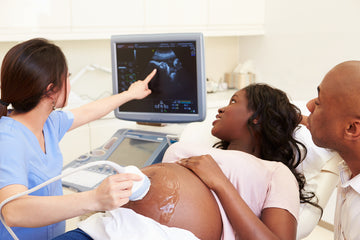A Mom's First 48 Hours Postpartum

Before giving birth, you will triple check that everything is ready for your newborn. You will have everything from tiny socks to miniature mail clippers organized and ready. What will you have ready for yourself? After having a baby, the first two days pass by in the blink of an eye.
Make a list of a few things to order or pickup before labor starts. You'll be grateful for them later! Cherish those first few days with your new baby, and love yourself, too.

A Mom's First 48 Hours Postpartum
Skin to Skin: Be as close to your baby as possible - skin to skin - for as often as possible.
Lochia (Bleeding): Call the midwife if you fill two pads in one hour or if the discharge becomes foul-smelling. In the first few days after birth, bleeding will be similar to a heavy menstrual period, both in color and amount. Clots may be passed, especially when getting up after you have been lying down. Massage your uterus if you are bleeding heavily during the first 24 hours and as often as you can in the first few days. It should feel like a grapefruit at or below the level of your navel. Discharge should turn to a brownish color and lessen steadily after the first few days. If fresh red bleeding persists or returns, decrease your activity level and call your midwife
Breastfeeding: Colostrum is ready at birth. Your newborn will only need drops at a time, as his stomach is the size of a marble. Remember that this liquid gold is nature’s vaccine for baby. Your body creates this milk specifically to meet the needs of your newborn. By 48 hours, you may be noticing your milk coming in. The latch is very important, as is creating the breastfeeding relationship. The first two days should be spent doing nothing more than admiring your newborn and nursing him.
After Birth Pains: These ‘pains’ are the contractions your uterus requires to get back to its original size. No one seems to talk about just how painful they are though. As you breastfeed, it will trigger the contractions. Yes, they are painful, but they are needed. You want your uterus back in shape quickly. (Also, the tincture “AfterEase” is amazing in helping with the pain.)
Herbal Bath: This healing tradition smells and feels glorious – and is reason for you to be alone, in a quiet room with (or without) your newborn, as the herbs are fine for the umbilical cord. Herbal baths are recommended throughout the first 2 weeks after giving birth.
Soreness: Having a baby can be compared to running a marathon. Within 24 hours afterward, every single muscle hurts.
Exhaustion: It’s as if the body just physically becomes heavy after your 'birth high' expires. You will need to sleep through this, fighting it is not healthy.
Bowel Movement: You just pushed out a baby, and now you are expected to poop. PLEASE take a natural laxative, it will make the experience so much easier.
Urinating: Chances are that you received a little friction burn to your urethra during birth. It is more common than not. This tiny little burn can cause a heck of a lot of pain while pee’ing! Make sure to keep a perri bottle full of warm water next to the toilet. Start quirting before you start to urinate!
Items to Have On Hand:
- Arnica
- After Ease Tincture
- Ice packs (for your sore lady parts)
- Heating pad: cramps, back ache
- Pads: overnight sized for the first two days.
- Bottom spray –Earth Mama Angel Baby brand is great.
- Perri bottle
- Tucks
- Old underwear: GRANNY PANTY style.
- Herbal bath
- Food: A well-stocked pantry and a refrigerator full of produce is a must!
- Water Bottle: A BIG one.
- Night gown: something loose fitting that you can sleep and nurse in, but does not hug your mid-section.
- Chux pads/puppy pads: Keep these under you the first few nights as you may bleed through your pad – or your milk may come in and cause extreme leaking. These pads can save you from washing the sheets when you wake up.
- Placenta Pills (They will take about 48 hours to have in hand)
Advice From Other Moms:
- SLEEP whenever possible
- Have family or friends help
- Hire a postpartum doula (if you are not near family or friends)
- Call the lactation consultant
- Take a vegetable based, natural laxative at the end of day 1
- Engorgement HURTS: Breastfeed as often as your newborn is awake. Use bagged, frozen peas to help the pain, take arnica around the clock, and pump just enough to relieve the swelling so baby can latch well. Over-pumping will trigger an over-supply and make the body produce even more milk.
- Massage your uterus often
- Let go of expectations
- Infection prevention: Wash your hands each time before you change your pad. Check your temperature if you feel any cold or flu-like symptoms. Uterine pain and/or foulsmelling discharge with a fever are signs of uterine infection. A tender breast with body aches and fever may indicate mastitis.
- Call Your Midwife: Your midwife/doctor does not disappear once baby is born. If anything, she becomes a constant in your life because of your pregnancy and birth!

WARNING SIGNS
Call the midwife/doctor immediately if you have any of the following:- Fever greater than 100.4F
- Any sign of localized swelling or tenderness in your breasts, especially if accompanied by body aches or fever. These are symptoms of a breast infection.
- Tender or sore nipples when nursing. These are signs of a poor latch that should be fixed very quickly in order to avoid nursing problems.
- Any sign of swelling or infection around the vagina, especially if you had a tear.
- Discomfort or burning when you urinate, having difficulty in urinating, or being unable to completely empty the bladder.
- Sharp pains in your abdomen, chest, or breast.
- Blurred vision or dizziness, with or without a headache.
- Chronic headache.
- Pain in your legs, especially the calf muscles, when you extend your foot.
- A foul smell or unexpected change in your bleeding (heavy bleeding and/or clotting after the first week), especially with uterine pain and fever.
- Bleeding lasting more than six weeks.
- Any strong sense that something is “wrong” with you or the baby.
- Crying spells or mood swings that feel out of control or do not get better with more sleep, rest, and nutrition.
- Thoughts of harming yourself or your baby.







